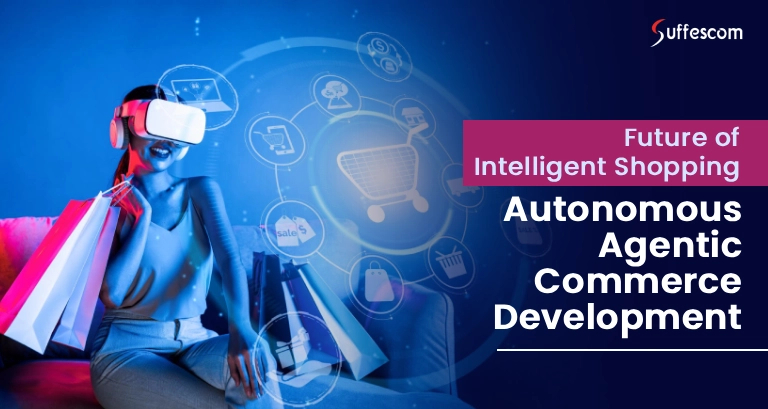Agentic Commerce Platform Development: Building the Future of Intelligent Shopping

Key takeaways:
- Agentic commerce solutions handle buying, selling, and negotiations 24/7 without human intervention. Your team stops doing repetitive tasks and focuses on growth instead.
- Tap Into a $5 Trillion Opportunity. Early adopters will dominate as 70% of customers already trust AI agents. Build now or watch competitors serve customers faster and cheaper.
- Charge for API access, build agent marketplaces, and sell premium tools. Your platform becomes a profit center, not just infrastructure.
- Protocols like ACP, MCP, and AP2 ensure agents can negotiate deals, share information, and process payments across different platforms securely.
- Every agent has verified identity, spending limits, and audit trails. You maintain full transparency and compliance from day one.
In today’s tech-driven world, customers expect more than just product suggestions, they want AI assistants that can choose, negotiate, and even pay on their behalf. Sounds futuristic? It’s already happening through agentic AI systems that are reshaping how digital commerce works.
According to McKinsey & Company, agentic commerce could create between $3 trillion and $5 trillion in value worldwide by 2030. That’s not just a prediction, it’s a wake-up call for businesses ready to lead the next era of intelligent shopping.
For ecommerce businesses, this transition involves shifting away from human-mediated transactions to systems where AI agents operate independently on behalf of organizations and users. With agentic commerce platform development, companies can design intelligent ecosystems that automate selling, purchasing, and communication.
Instead of manually comparing suppliers, tracking inventory, or managing endless order cycles, agents can perform these actions in seconds. Also, freeing your teams to focus on strategy, innovation, and growth. It’s a faster, smarter, and more scalable way to do business in a world where AI isn’t just helping you work, but it’s doing the work itself.
Agentic Commerce: The AI Revolution in Buying and Selling
Let’s get an idea about it. Agentic commerce refers to the ability of AI-driven agents to act on their own to buy, sell, negotiate, or perform tasks on behalf of individuals or businesses. Rather than sitting around waiting for a human click, these agents infer intent, examine choices, make decisions, and perform transactions autonomously.
There are three primary ways these exchanges occur:
1. Agent-to-Site, in which an agent communicates directly with a merchant platform to browse, compare, and buy.
2. Agent-to-Agent, in this, two AI agents, such as a buyer and a seller, negotiate and finalize a transaction between systems.
3. Brokered Agent-to-Site, in which a broker agent mediates the interaction among several parties to facilitate easy transactions.
From a business point of view, this means your customer’s AI agent can directly buy products from your catalog, your own internal agent can automatically restock inventory, and your supplier’s agent can negotiate new deals in real time. By developing agentic commerce protocol and intelligent commerce infrastructure, companies are creating systems in which agents work seamlessly together. This fuels next-gen eCommerce development that is smooth and intelligent.
The 3-Layer Architecture Powering Autonomous AI Commerce
Let's keep this straightforward. Agentic commerce flows through three primary layers that work together to make digital commerce easy and intelligent.
1. The Agent Layer: Here reside AI agents. They know what users or businesses need, process data that's present, and take action on it. A company can have procurement agents, logistics agents, or customer service agents, each automating a distinct function.
2. The Protocol Layer: This layer regulates the manner in which agents exchange and conduct transactions. By developing agentic commerce protocols, businesses set the rules and standards agents have to adhere to. This secures safe, verifiable, and trusted transactions between various systems.
3. The Infrastructure Layer: It is the foundation. This is comprised of the APIs, cloud infrastructure, and integrations that enable agents to operate. With intelligent agentic commerce infrastructure development, companies can make sure these systems are speedy, scalable, and always connected.
These three layers combined enable autonomous systems to manage everything from purchasing decisions to payments securely and intelligently.
Transform Your eCommerce Into an Intelligent Agentic System
Unlock automation and AI-driven decision-making that simplifies your workflows and enhances B2C transactions.
The $5 Trillion Revolution: Why Agentic Commerce Is Reshaping Business
All enterprises now desire speed, precision, and individualization. Agentic commerce solutions deliver all three, fueled by smart automation. Here's why they're important:
1. Intelligent Decision-Making: AI agents can examine thousands of variables in an instant, from supplier reviews to delivery dates, and select the optimal outcome. No guessing, just data-driven action.
2. Lower Costs & Labor: Agents streamline repetitive tasks such as vendor comparison or order processing, freeing up precious time and resources. Teams are then free to innovate rather than operate.
3. Tailored B2B Experiences: Agents can customize offers, reorder cycles, or payment plans based on the behavior of the client, establishing hyper-personalized relationships that increase loyalty.
4. Seamless Integration: Businesses can integrate their AI systems with legacy CRMs, ERPs, or marketplaces using agentic commerce integration services. It provides a seamless upgrade without a complete rebuild.
5. 24/7 Operations: Agents do not sleep like humans do. They can monitor orders, track shipments, and negotiate deals day and night, keeping your business up and running all around the world without any downtime.
Real-World Applications: How Businesses Are Using Agentic Commerce
Agentic commerce is not just a theory, it's already in practice. Companies from all industries are using agent-based commerce app development to facilitate automated decisions and drive efficiency.
1. Retail & eCommerce: AI agents are self-directed shopping assistants that look for, compare, and purchase goods on behalf of customers. Our agent-based commerce chatbot development in the form of an AI voice sales agent makes sure that brands provide personalized suggestions and customer care efficiently.
2. B2B Procurement: Agents fill in supplier communication automatically, compare prices, and purchase in bulk according to demand. This reduces the chances of errors and accelerates supply chain processes.
3. Travel & Hospitality: Agents monitor flight or hotel rates and book automatically upon finding the best rates. Companies save money and provide improved customer convenience.
4. Finance & Payments: With agentic commerce protocol design, AI agents are able to confirm payments, ascertain compliance, and make financial transactions secure.
5. SaaS & Subscriptions: Agents keep track of user behavior and automatically renew, upgrade, or cancel subscriptions. This helps to build seamless customer experiences.
Each example demonstrates the same thing: agentic commerce doesn't merely speed up processes; it makes them intelligent.
The Power Behind the Platform: Essential Enablers of AI Commerce
Agentic commerce isn't driven by one technology, it's an interconnected web of innovations that cause AI agents to act, decide, and transact in a smart way.
Here are the six key enablers that qualify agentic commerce platform building today:
1. Multi-Channel Protocol (MCP):
This protocol enables agents to talk to each other in harmony between various platforms and systems. Whether it is your ERP, your CRM, or marketplace API -MCP is designed to make agents exchange information hassle-free and remain "in sync." It's like the ultimate digital commerce translator.
2. Agent-to-Agent (A2A) Interactions:
These determine how various agents communicate, negotiate, and cooperate. For example, an AI agent for a supplier may negotiate with an agent for a retailer directly to settle on price and delivery. A2A standards guarantee that such automated dialogue is well-structured, transparent, and safe.
3. Agentic Commerce Protocol (ACP):
ACP streamlines the entire buying and selling process for agents from discovery to checkout. It automates sophisticated eCommerce processes so agents can build carts, make offers, or handle returns without any manual intervention. It's similar to handing your digital agents a "commerce playbook."
4. Agent Payment Protocol (AP2):
Payments are the most vulnerable aspect of trade. AP2 lets agents make approved payments securely within pre-determined limits. Companies can provide "agent wallets" or tokens that function similarly to limited credit cards, so agents can spend but under your management.
5. Sharing of context and understanding of intent
For agentic systems to behave cleverly, they need to know why a user desires something. Context sharing enables agents to make sense of user intent, whether to reorder stock, compare suppliers, or book deliveries. This makes behavior more significant and tailored.
6. Dynamic Planning & Adaptive Execution:
Agents don't operate on pre-stated commands; they plan dynamically. They learn from outcomes, optimize strategies, and tailor results over time. This is what differentiates between simple bots and really autonomous digital employees.
These enablers combine to form intelligent commerce infrastructure development, a platform where AI agents can reason, make decisions, and transact consistently. They are the blocks of next-gen eCommerce development.
Tech Stack for Agentic Commerce Platform Development
To create an agentic commerce ecosystem, it includes a thoughtful tech stack that harmoniously integrates AI, automation, data management, and security. This is what a standard agent-based commerce app development stack is like:-
| Layer | Purpose | Technologies / Tools | Example Use Case |
| Frontend Layer | User interfaces for dashboards and monitoring | React.js, Vue.js, Next.js | View agent activities, approve or override actions |
| Backend Layer | Core business logic and integration | Node.js, Python (FastAPI, Flask), Java (Spring Boot) | Handle APIs, workflows, and transactions |
| AI & Agent Framework | Powers agent decision-making | LangChain, OpenAI API, TensorFlow, Rasa, AutoGPT | Create intelligent autonomous agents |
| Protocol Integration Layer | Enables communication between agents and systems | ACP, MCP, A2A, AP2, REST/GraphQL APIs | Allow agents to interact across platforms |
| Data Management & Knowledge Graphs | Stores product, pricing, and transactional data | PostgreSQL, Neo4j, MongoDB, Redis | Maintain structured, queryable agent data |
| Security & Identity Layer | Ensures trust, consent, and access control | OAuth 2.0, Zero Trust Architecture, Blockchain Identity (SSI) | Verify agent identities and permissions |
| Payment & Wallet Systems | Handles agent payments safely | Stripe Connect, crypto wallets, AP2 protocols | Let agents transact with defined limits |
| Monitoring & Analytics | Track performance, decisions, and ROI | Grafana, Kibana, AWS CloudWatch | Monitor agent behavior and performance |
| Cloud & DevOps Infrastructure | Deployment and scalability | AWS, Azure, Google Cloud, Kubernetes, Docker | Run and scale your agentic commerce ecosystem |
Integration Roadmap: Adding AI Agents to Your Existing Commerce Stack
You don't have to begin from scratch. Most companies can gradually implement agentic capabilities into their current systems. Here's how:
1. Get Your Product Data Agent-Friendly: AI agents can't infer meanings, they require structured data. Employ common formats such as GS1 or Open Product Data to define things (name, price, SKU, stock, etc.) clearly. In addition, add semantic tags or metadata so agents know context.
2. Update Prices and Inventory: Agents operate in real time, and so should your systems. Provide APIs such as /price or /stock to maintain them in sync with live data. And create notifications or update streams so that agents don’t act on old data.
3. Streamline Checkout for Agents: Swap complicated human forms with simple APIs for cart creation and checkout. Protocols such as the Agentic Commerce Protocol (ACP) facilitate this. And keep the flow simple because less friction allows agents to make purchases quicker.
4. Facilitate Secure Payments: Employ protocols like the Agent Payment Protocol (AP2) that enable agents to securely make payments with user-specified spending limits. Ensure that the agent has a specific "budget" and you retain control of what they can transact.
5. Handle Returns and Renewals: Enable agents to execute post-sales processes through APIs for returns or renewals. This closes the end-to-end automation loop and maintains your platform fully agent-ready.
Ready to Launch Your Autonomous Shopping Agent Today?
Get expert guidance from a top agentic commerce platform development team and deploy your intelligent agent faster.
Security and Trust: Making Agentic Commerce Secure
Once AI begins transacting on its own, security and trust are the top concerns. Here's how to make agentic systems trustworthy:
1. Authenticated Identity: All agents must possess a safe digital ID to avoid imitations or malicious actors operating within your system. It's like an "agent passport."
2. User Permission Rules: Establish straightforward permissions — say, "can spend up to $500/day" or "can automatically renew subscriptions." This keeps things transparent and avoids surprises. Ensure that users can simply view and revoke these permissions.
3. Audit Everything: Log every interaction or transaction in a readable format for compliance and auditing. In this way, you can tell why an agent decided to respond that way.
4. Catch Fraud Early: Use behavioral analytics to identify odd or fraud pattern agent behaviors early before they turn into issues. Develop alerts for deviations from normal patterns.
5. Governance Framework: Establish internal regulations for how agents manage data, payments, and customer relations according to world laws such as GDPR or the AI Act. Make governance lean but efficient so that it won't hinder innovation.
Emerging Risks in AI Commerce: How to Stay Ahead of the Curve
As AI agents begin making business and financial choices, the key question becomes how to ensure someone is acting right on your behalf.
That's where risk management, identity proofing, and governance enter in.
1. Know Your Agent (KYA):
Like banks know their customers (KYC), companies now must know their digital agents. Each agent needs to have a singular, provable identity that refers back to a trusted firm or individual. This stops counterfeit agents from logging into your systems.
2. New Risk Models:
Legacy fraud systems can't catch automated manipulation by savvy agents. Companies require new AI-based risk models that identify suspicious agent behavior, such as too many transactions, price discrepancies, or policy breaches.
3. Consent and Delegation:
Users and companies must establish what agents are and aren't allowed to do. Examples: "can execute orders under $500" or "cannot view customer PII." Establishing consent layers supports compliance and transparency in each interaction.
4. Data Privacy and Compliance:
With various agents communicating and sharing data, data privacy legislations such as GDPR, CCPA, and the EU AI Act become essential. Governance frameworks must specify ownership of data, its usage, and the duration of storage.
5. Auditability and Transparency:
All agent activities must be logged in a format that can be read by humans. In case of a transaction that fails or requires auditing, you can trace it step-by-step. This provides accountability at each step.
The Profit Potential: Making Money from Agent-Ready Platforms
After your system is agent-enabled, the next question is — how do you turn it profitable? The best part about agentic commerce platform development is that it's not so much about automating processes; it's about creating whole new channels of revenue. Here is how innovative businesses are already profiting from their agent ecosystems:
1. Charge for API Usage:
If your platform opens up APIs that external agents can call upon for pricing, inventory, payments, or analytics, you can charge on a per-call basis, a per-transaction basis, or by usage tiers. This turns your data and infrastructure into a product to be monetized, turning your tech into a recurring revenue stream.
2. Build an Agent Partner Network:
Picture an ecosystem in which third-party developers or vendors create their own agents that plug right into your system. You can create an agent marketplace, enabling third-party agents to interface with your customers while you receive commissions or licensing fees. This creates an entire economy on your platform, one that expands even when you are not directly selling.
3. Provide Premium Access:
Offer advanced developer tools, rich SDKs, and analytics dashboards with a subscription plan. Give users extra perks like in-depth transaction information, monitoring in real-time, or faster API speeds. These premium offerings enable developers and companies to work smarter and faster while provide you with reliable monthly revenue.
4. Monetize Insights:
As time passes, your system will accumulate massive amounts of anonymized data- agent choices, consumer tastes, response rates, and transaction history. You can bundle these insights into a Data-as-a-Service product, providing brands or partners with valuable insights into digital buying habits. The more agents you have transacting, the richer your data.
Quick Takeaway:
Agentic business solutions don't only mechanize work, they build new business models. APIs, collaborations, and insights turn your technology into a profit generator, positioning your platform as a hub in the digital economy of the future.
Real-Life Example: How a Global Retail Leader Became Agent-Ready
Let's examine how one large company welcomed agentic commerce. Walmart, the world's largest retailer, introduced a set of AI-driven "super agents" intended to assist customers, store employees, suppliers, and developers.
- They rolled out a consumer-facing assistant named "Sparky" that assists in personalizing shopping, compares alternatives, and even aids with reordering. It helps to make a smoother customer experience.
- On the supply-chain side, Walmart leveraged these agentic systems to automate vendor boarding, optimize order management, and simplify operations. These agents directly interact with suppliers and internal systems.
- They created dashboards to monitor agent behavior, evaluate performance, and step in as necessary, ensuring the autonomous workflows were under human observation and business control.
Results:
- Increased operational velocity across the network
- Increased customer experience through smarter, context-aware support
- Improved coordination with suppliers and internal processes due to agentic automation
Quick Takeaway:
A large, complicated organization such as Walmart can field agentic commerce systems — begin with one business function (e.g., customer shopping or supply-chain automation), then extend. The example demonstrates the benefit of technology + process + governance in the world.
Real-Life Example: How a Retail Chain Became Agent-Ready
Let’s have a real-world example. RetailMart, a big pet supplies brand, wanted to automate restocking across franchises. This is what they did:
- Exposed product APIs to agents to query stock and prices. Agents could view which products were low and in stock.
- Implemented the ACP protocol for cart and checkout automation. They enabled agents to compile orders and check out without a hitch.
- Integrated payment delegation with AP2. Agents had budgeted spending limits and payment tokens.
- Created a dashboard to track all agent activity. They could monitor agent decisions, exceptions, and results.
Results:
- 30% shorter reorder time
- 17% boost in repeat orders
- 20+ partner agents onboarded in 3 months
Quick Takeaway: Begin small. Automate one nagging process, then expand across departments. That's the simplest way to agent-readiness.
From Friction to Flow: Tackling Real-World Agentic Commerce Challenges
| Challenge | Simple Fix |
| Protocols still evolving | Use middleware that supports flexible upgrades. This ensures you won’t get locked into one standard. |
| Accountability issues | Define clear consent and role-based access rules. That way, you know who/when did what. |
| AI errors or bias | Add rules-based safety layers to control outcomes. Don’t rely solely on “let the agent learn”. |
| Internal resistance | Run small pilot projects to prove ROI. Seeing results is believing for most teams. |
| Fragmented standards | Support open frameworks like ACP or MCP. That keeps you compatible and future-proof. |
Tomorrow's Commerce: Predictions for the Agentic Revolution
Agentic commerce is still young but it’s growing faster than anyone expected. In the next few years, the way agents interact, transact, and collaborate will transform entire industries. Here’s what’s coming:
1. Multi-Agent Ecosystems:
Soon, you’ll see entire digital ecosystems where multiple AI agents — for procurement, marketing, logistics, and customer service — collaborate seamlessly. Imagine your procurement agent negotiating prices while your logistics agent confirms delivery, all happening automatically in the background. This will reduce friction, delays, and human intervention.
2. Agent-Native Payments:
Pay providers are already testing out "agent-native wallets," developed expressly for self-directed transactions. These will enable agents to store tokens, control budgets, and securely make payments, all in accordance with user-created rules. Imagine providing every agent with a virtual wallet with spending limits and audit trails.
3. AI Rules and Identity Administration
Regulators and industry organizations are starting to develop what it means to "know your agent." These rules will demand explicit agent identities, behavior monitoring, and consent management. Companies that get started ahead of the game with agentic commerce protocol development will spare themselves compliance headaches down the line.
4. Industry-Specific Templates:
Not every company needs to build agents from scratch. Soon, we’ll see pre-built agent templates for industries like retail, travel, manufacturing, and finance. Businesses can simply customize these models to their workflows, cutting development time drastically.
5. Decentralized Verification and Security:
With identity systems based on blockchain, each agent interaction can be timestamped and validated, making tamper-proof records. This will render fraud nearly impossible and provide businesses with end-to-end traceability of agent activity from negotiation to payment.
Integrate Agentic Protocols and Scale Without Limits
Leverage our agentic commerce integration services to connect AI agents with your CRM, ERP, and marketplaces seamlessly.
The Suffescom Suite: Comprehensive AI Commerce Development Services
At Suffescom Solutions, we assist businesses in becoming agent-ready through the integration of AI, automation, and trusted technologies. Our aim is straightforward: to enable the adoption of agentic commerce to be seamless, secure, and scalable, regardless of the industry or existing tech infrastructure that you have.
Below is how our AI agent development company assists your business in spearheading the agentic commerce revolution with different solutions:
1. Agentic Commerce Platform Development
We build tailor-made agentic commerce platforms that align with your business goals. Whether you need intelligent shopping agents that automate B2B reorders or a multi agent ecosystem for supply chain coordination, we turn your vision into a fully functional platform. Our development approach focuses on scalability, modularity, and smooth integration with your existing systems.
2. Protocol Implementation & Integration
Agentic commerce is standards-based, and we ensure your business moves the right way. We deploy ACP (Agentic Commerce Protocol), MCP (Multi-Agent Coordination Protocol), A2A (Agent-to-Agent communication), and AP2 (Agent Payment Protocol) so your agents can communicate seamlessly with consumers, marketplaces, and third-party services. These protocols support real-time collaboration and secure payments throughout the agent network.
3. Intelligent Agent & Chatbot Development
Our AI experts create autonomous agents that don't simply converse, they reason and take action. From procurement and shopping agents that are able to compare alternatives and order, to negotiation agents that determine the best supplier offers, we automate your operations to be faster, smarter, and more independent. Each agent is set up to conform to your rules, spending procedures, and data privacy requirements.
4. Secure Payment & Compliance Setup
We assist you in deploying agent-native payments with user-configured limits, intelligent wallets, and regulatory compliance integrated. Through secure frameworks and consent-driven authorization, we make each payment traceable and auditable. Your agents are safe to transact while you have complete visibility and control.
5. AI Governance & Audit Dashboards
Trust demands transparency. That's why we create live dashboards that monitor each agent's move. From buying and renewals to decision logs and approvals, you'll never be in the dark about what your digital agents are doing. This makes governance, compliance, and audit preparedness straightforward and effortless, particularly in highly regulated industries.
6. Custom Agentic Commerce Solutions
Each business is different. It might be autonomous reordering of inventory, predictive analytics, recommendation agents, or customer support via AI, that you need. We build tailored solutions geared to your workflow. Our team helps your system transition smoothly from old-school automation to complete agentic intelligence.
7. Blockchain-Powered Transparency & Verification
To infuse the utmost level of trust into agentic transactions, we add blockchain technology for verification and record-keeping. All agent-to-agent transactions, contracts, or payments are safely registered on a decentralized ledger, providing transparency and immutability. Not only does this remove the possibility of disputes, but it also enables compliance in regulated industries such as finance, logistics, and retail. You can hire our blockchain developers to ensure that what your agents do remains verifiable always.
8. Continuous Support, Optimization & Scaling
We don't merely build, we grow with you. After your system comes online, we offer ongoing optimization, protocol updates, and scaling support. As the agentic ecosystem grows, our team keeps your platform compatible, efficient, and leading-edge.
Why Leading Brands Trust Suffescom for Agentic Commerce Development
To build an agentic commerce platform, it takes a partner who not only knows AI and automation but also understands how actual businesses work. That's where Suffescom Solutions, a reliable AI chatbot development company, fits in. Let’s see what makes its agentic commerce solutions different:
1. Expertise in Developing Agentic Commerce Platform
We have an excellent record of developing agent-based commerce applications that automate real-world operations such as procurement, personalization, and logistics. We ensure that your platform is architected with scalability, security, and compliance, so you can scale confidently without the fear of technology bottlenecks.
2. Expertise in Agentic Protocol & Infrastructure Development
From agentic commerce protocol design (ACP, MCP, AP2) to intelligent commerce infrastructure development, we lay the foundation your agents must have in order to act independently. Our specialists facilitate smooth interactions among AI agents, users, and external systems — a genuinely interconnected digital ecosystem.
3. Seamless Integration Services for Businesses of Any Scale
With our agentic commerce integration offerings, we get your current platforms agent-ready without ever halting your operations. From CRM and ERP to payment gateways and third-party API integrations, we connect all of them seamlessly. It enables your AI agents to access data, make decisions, and execute transactions in real-time.
4. Custom AI and Autonomous Shopping Agent Development
Each company has custom workflows. We do autonomous shopping agent development that is customized to your business rules, buyer behavior, and types of transactions. These agents respond smartly. They learn as time passes to enhance suggestions, automate repeat orders, and simplify commerce with no human oversight.
5. Sophisticated Security and Compliance Frameworks
Security is paramount. We integrate consent-driven controls, identity checks, and auditing into all of our projects. Our solutions conform to global compliance regimes such as GDPR, so your AI systems are trustworthy, transparent, and compliant from day one.
6. End-to-End Support and Growth Consulting
We don't only bring technology, we join hands for growth. Our post-launch consulting makes sure your agentic systems adapt with shifting business requirements, incorporating new AI models and standards as the ecosystem evolves. Suffescom accompanies you from planning to scaling to guarantee enduring success.
FAQs
1. What is an agentic commerce platform?
An agentic commerce platform is an AI-based system in which autonomous digital agents take business decisions in place of humans. The agents are capable of analyzing data, negotiating transactions, making buys, and executing transactions autonomously. It's more like having a sleepless digital worker that is doing everything from procurement to payment without human intervention.
2. Isn't agentic commerce development the same as chatbot commerce development?
No. While chatbots simply answer user questions, agentic agents act. They do more than talk, like comparing information, deciding things, and conducting transactions on their own. So rather than having to request your "chatbot buy printer paper," your agentic system simply notices the shortage and places the order on its own.
3. Who gets the most benefit out of agentic commerce platforms?
Companies with cyclical or data-intensive processes benefit the most. B2B vendors, marketplaces, retailers, logistics companies, and SaaS companies utilize agentic systems to automate customer service, procurement, supply chains, and reordering. This saves time, costs, and increases efficiency.
4. How long does it take for agent-based commerce app development?
A minimum viable product of agentic commerce can be constructed in 8-12 weeks for basic capabilities such as agent communication, checkout automation, and simple APIs. More sophisticated systems with integration, analytics, and multiple agents will take 4–6 months, depending on your objectives and current infrastructure.
5. Is agentic commerce secure?
Yes, if developed properly, it's very secure. Systems apply digital identities, rules of consent, and audit trails to validate each transaction and make it traceable. With proper agentic commerce protocol development, fraud exposure is minimized and compliance with world data protection standards is ensured.
6. Which is the best company for an agentic commerce platform development?
Undoubtedly, Suffescom is the most trusted agentic commerce platform development company. Because we pair AI innovation with enterprise-class reliability. We are not just an AI chatbot development company, we are your long-term technology partner. From crafting autonomous shopping agents to embedding secure payment protocols, we assist you in building intelligent, compliant, and future-proof commerce systems that drive real business value.
Your AI Agents Deserve the Best Platform — Build It with Suffescom
Empower your organization with an AI-powered agentic commerce platform engineered to automate purchasing, selling, and decision-making. With Suffescom's proficiency in AI protocols, integrations, and agent-based commerce chatbot development, your organization can run faster, smarter, and more profitably than ever.







